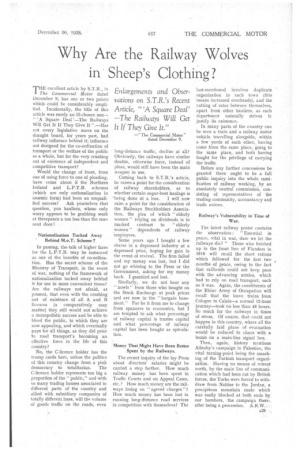Why Are the Railway Wolves in Sheep's Clothing?
Page 31

If you've noticed an error in this article please click here to report it so we can fix it.
Enlargements and Observations on S.7. .R.'s Recent Article, "'A Square Deal' —The Railways Will Get It If They Give It."
—"The Commercial Motor" dated December 9.
THE excellent article by S.T.R., in The Commercial Motor dated December 9, has one or two points which could be considerably amplified. Incidentally, the title of this article was surely an ill-chosen one" A Square Deal '—The Railways Will Get It If They Give It ".—Has not every legislative move on the draught board, for years past, had railway influence behind it; influence not designed for the co-ordination of transport or the welfare of the public as a whole, but for the very crushing out of existence of independent and competitive transport?
Would the change of front, from one of using force to one of pleading, have come about if the Northern Ireland and L.P.T.B. schemes (which are only nationalization in anmmic form) had been an unquali fied success? Ask yourselves that question, you hauliers, whose only worry appears to be grabbing work at threepence a ton less than the man next door!
Nationalization Tucked Away Behind M.o.T. Scheme ?
In, passing, the-talk of higher fares for the L.P.T.B. may be instanced as one of the benefits of co-ordination. Has the secret scheme of the Ministry of Transpoit, in the event of war, nothing of the framework of nationalization tucked away behind it for use in more convenient times? Are the railways not afraid, at present, that even with the crushing out of existence of all A and B licences (a comparatively easy matter) they still would not achieve a monopolistic success and be able to bleed the public, to which they are now appealing, and which eventually pays for all things, as they did prior to road transport's becoming an effective force in the life • of this country?
No, the C-licence holder has the trump cards here, unless the politics of this country change from a pink democracy to totalitarian. The C-licence holder represents too big a proportion of the "public," and with so many trading houses associated in different parts of the country and allied with subsidiary companies of totally different hues, will the volume of goods traffic on the roads, even long-distance traffic, decline at all? Obviously, the railways have similar doubts, otherwise force, instead of pleas, would still have been the main weapon in use.
Coming back to S.T,R.'s article, he raises a point for the consideration of railway shareholders, as to whether certain sugar-beet haulage is 'being done at a loss. I will now raise a point for the consideration of the Railways Stockholders Association, the plea of which "elderly women" relying on dividends is in marked contrast to "elderly women " dependents of railway employees.
Some years ago I bought a few shares in a depressed industry at a depressed price, hoping for gain in the event of revival. The firm failed and my money was lost, but I did not go whining to the Press or the Government, asking for my money back. I gambled and lost.
Similarly, we do not hear any " howls" from those who bought on the Stock Exchange at peak prices and are now in the "bargain basement." Far be it from me to change from spanners to economics, but I am tempted to ask what percentage of railway capital is trustee capital and what percentage of railway capital has been bought as speculation.
Money That Might Have Been Better Spent by the Railways.
The recent inquiry of the lay Press about directors' salaries might be carried a step farther. How much railway money has been spent in Traffic Courts and on Appeal Cases, etc.? How much money are the railways losing on "agreed charges"? How much money has been lost in running long-distance road services in competition with themselves? The
last-mentioned involves duplicate organization in each town (this 'means increased overheads), and the cutting of rates between themselves, apart from other hauliers, as each department naturally strives tc justify its existence.
In many parts. of the country can be seen a train and a railway motor vehicle travelling alongside, within a few yards of each other, having come from the same place, going to the same place, and both having fought for the privilege of carrying the traffic
Before any further concessions be granted there ought to be a full public inquiry into the whole ramification of railway working, by an absolutely neutral commission, consisting of representatives of the trading community, accountancy and trade unions.
Railway's Vulnerability in Time of War.
The latest railway poster contains the observation : "Essential in peace, vital in war, dare we let the railways die? " Those who finished up in the front line of Flanders in 1918 will recall the short rations which followed for the first two months of peace, owing to the fact that railheads could not keep pace with the advancing armies, which had to rely on road transport, such as it was. Again, the constituents of the Rhine Army of Occupation will recall that the leave trains from Cologne to Calais—a normal 12-hour journey—took no less than 48 hours. So much for the railways in times of stress. Of course, that could not happen in this country, where all the carefully laid plans of evacuation would be reduced to chaos: with a bomb on a main-line signal box.
Then, again, history mentions Allenby's campaign in Palestine, the vital turning-point being the smashing of the Turkish transport organization. Having no means of retreat• north, by the main line of communication which had been cut by British forces, the Turks were forced to withdraw from Nablus to the Jordan, a precipitous mountain route which was easily blocked at both ends by our bombers, the campaign thereafter being a procession. .A.R.W..












































































